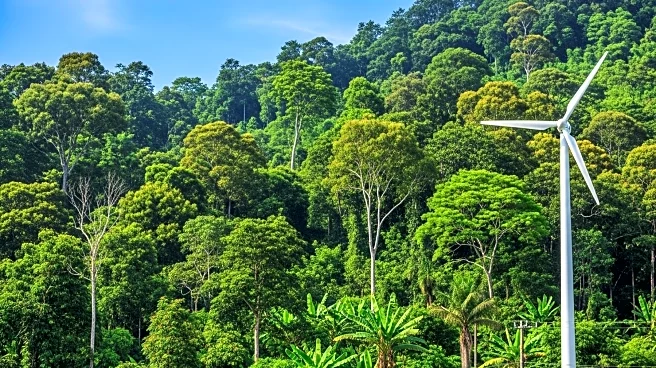What's Happening?
India is making significant strides in its climate policy landscape, focusing on carbon removal and emissions management. The Government of India has introduced mandatory Greenhouse Gas Emission Intensity (GEI) targets for high-emission industries under the Carbon Credit Trading Scheme (CCTS), 2023. These targets apply to sectors such as Aluminum, Iron & Steel, Petroleum Refineries, Petrochemicals, and Textiles. Entities that exceed their targets can earn tradable carbon credits, while those that fall short must purchase credits or face penalties. Additionally, India and Japan are finalizing a Joint Credit Mechanism (JCM) to enable Japanese firms to invest in carbon-reduction technologies in India. The partnership aims to boost decarbonization efforts in sectors like solar energy and green hydrogen.
Why It's Important?
India's policy shifts represent a critical step towards operationalizing its carbon market and enhancing international cooperation for decarbonization. By setting emission intensity targets, India provides clarity to industries and encourages sustainable practices. The collaboration with Japan offers a strategic opportunity to channel international finance into clean energy sectors, leveraging Japanese expertise. These initiatives align with global climate goals and demonstrate India's commitment to reducing emissions and fostering a sustainable environment. The policies also support the growth of carbon removal technologies, which are essential for achieving long-term climate resilience.
What's Next?
India's climate strategy will continue to evolve with the implementation of the Carbon Credit Trading Scheme and the Joint Credit Mechanism with Japan. Public comments on the draft rules for emission intensity targets are open for 60 days, allowing stakeholders to provide input. The partnership with Japan may lead to increased investments in clean energy technologies and further collaboration on decarbonization projects. India's focus on climate finance taxonomy and biochar carbon removal initiatives in Punjab indicates ongoing efforts to align financial flows with climate goals and address air pollution. The Carbon Removal India Alliance remains committed to supporting research and pilot projects to advance the carbon removal ecosystem.










